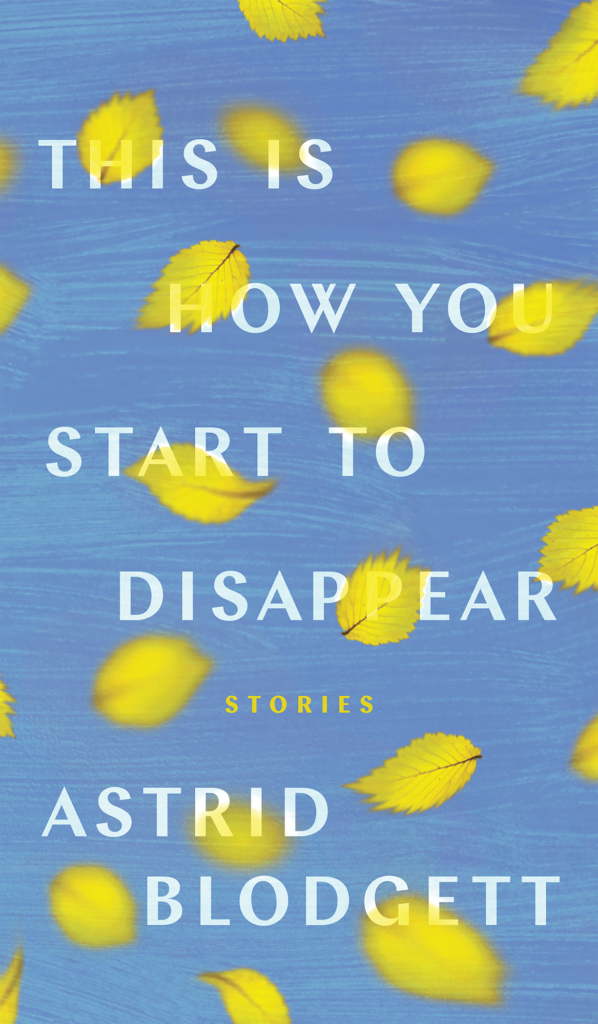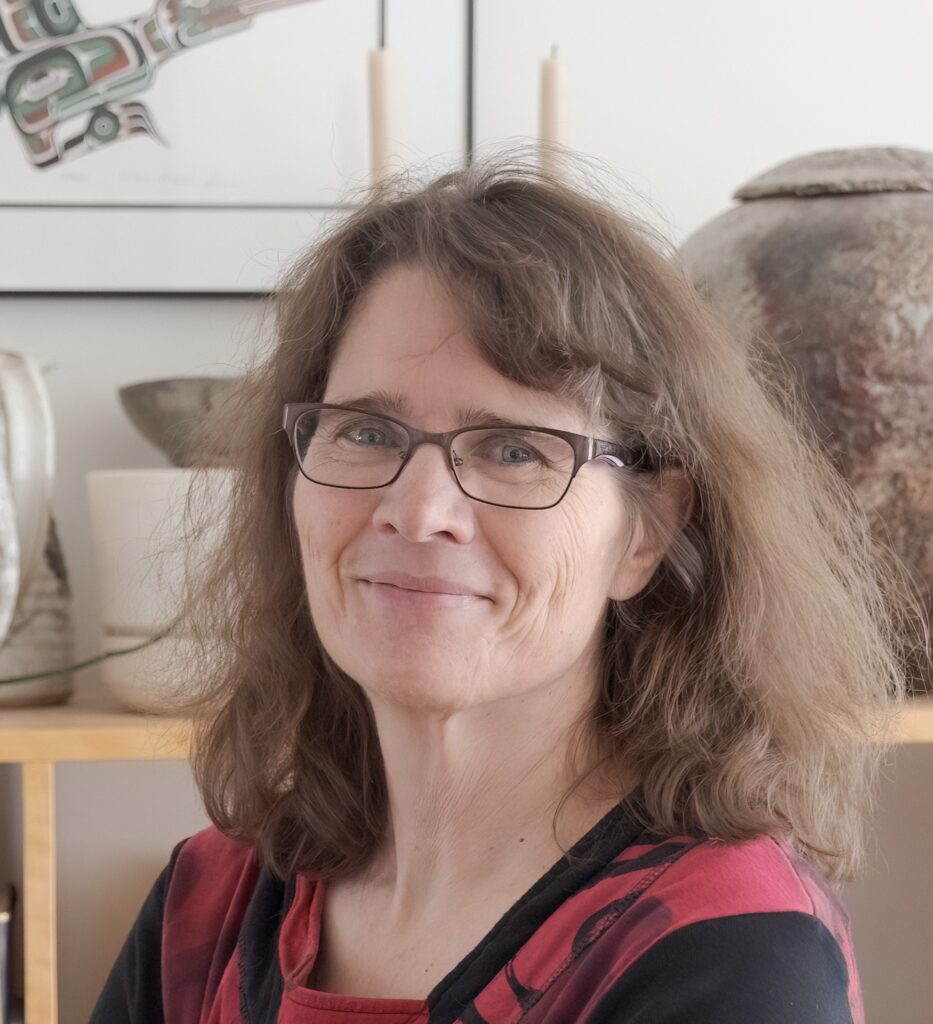
Interview by J. Kaur
In August this year, the University of Alberta Press published a collection of 12 short stories by Astrid Blodgett. The book is part of the Robert Kroetsch Series, which is a collection of Canadian creative writing and poetry books published by the Press. This Is How You Start To Disappear contains short stories that illustrate the grief and trauma that can be found in an ordinary life. It focuses on the heartbreak that comes from disconnects in relationships and tragedies that strike unexpectedly.
There is a range of different perspectives in the collection with each character being vastly different from the next. A woman reminisces about a summer when she was a child and she watched her parents’ deteriorating relationship, as they struggle to have kindness or patience for each other. There is a young girl trying to enjoy an evening on the ice with her father, taking on the heavy burden of navigating his mood and keeping him happy – only to then come to the crushing realization that he isn’t there for her, that he almost seems to see right through her. The disappearance of a person, even while they’re there in front of you, is a prevalent theme throughout the stories, and they show how many ways a person can become invisible.
Astrid Blodgett is an Edmontonian, and the backdrop of nature and outdoor activities in her stories highlights her love for the outdoors. She wrote another collection of short stories, You Haven’t Changed A Bit, in 2013, which was nominated for a number of awards, such as the 2013 Danuta Gleed Literary Award. Her short stories have appeared in a number of publications and literary magazines, including The Journey Prize Anthology and Inostrannaya Literatura. At the University of Alberta, Blodgett won the James Patrick Folinsbee Award for her creative writing, and she has been short-listed for the Writers’ Guild of Alberta Howard O’Hagan Award for Short Story.
Having always been interested in writing myself, I was curious to learn more about Blodgett’s thoughts and her process for writing this book.
Interview with the author, Astrid Blodgett

Astrid Blodget
photo by Eric Visser
J Kaur: Thank you for taking the time to speak with me. What motivated you to write this book?
Astrid Blodgett: I’ve always written short stories my whole life and the motivation is a desire to write. And eventually when you have enough stories, you put them together in a book.
J Kaur: I know that you had another collection as well, published in 2013. I read that it took about 10 years to write You Haven’t Changed A Bit and then this collection was published this year. Is there a reason for such a long creative process?
Astrid Blodgett: Yeah, I think I’m a slow writer and also I work part time. I can’t devote most of my days to writing, so it takes time to write and rewrite and it also can take a long time to find a publisher. For instance, I contacted several presses before I found a publisher, and when I did, it was almost two years before the book was published. So that’s part of the whole process too.
J Kaur: In this book, I know you write a lot about Edmonton. How important is it to make sure that those stories are based in the city that you live in?
Astrid Blodgett: Yeah, it’s where I live, it’s a place I know. I like it. I think because I know it so well it makes sense to write about it.
J Kaur: Was there a particular story that you really enjoyed writing or maybe not enjoy but was impactful to write?
Astrid Blodgett: They’re all so different, you know. I loved writing When Sleep Is Easy. I loved imagining what it was like to be that older woman, the grandmother. And likewise, there’s a story from the perspective of a child who’s out skating with her family. And I love that too, just getting into her head. But there isn’t one in particular that I can say I loved more than the other.
J Kaur: Are these based on experiences that you’ve had, things you’ve seen?
Astrid Blodgett: People in the book go skating and walking and biking and canoeing. And of course I’ve done all this. But the situations the characters get into are not my situations. I mean, they might be. But for the most part, these are characters who have lives of their own, and they get up to no good and they get up to stuff. So what they do is not based on what I’ve done necessarily, except, as I said, canoeing or biking or walking or driving a car.
J Kaur: You write from the perspective of so many different kinds of characters. Is it difficult to get into the voice of a character that’s so vastly different from each one?
Astrid Blodgett: It’s not too difficult, I hope that my characters don’t sound all the same because you do want the variety. A lot of it is picturing somebody and listening to that person and imagining what that person would do. And writers tend to be very good observers and listeners. When we’re out in the world, we’re always listening. We pick up on the ways people speak and the ways people do things that are different or similar to what we do. And I think we’re constantly absorbing this in our daily lives. So it’s not too hard to imagine some parts of another person’s life. We can’t imagine everything, of course, but for the most part, just listen to what’s going on in the world.
J Kaur: I know you’ve already mentioned that you’re a busy person. But is there anything particular to your writing process?
Astrid Blodgett: Nothing particular. I used to go away once a year to a writing retreat at a place called Strawberry Creek Lodge. And the owners have retired. So for the last few years I haven’t gone. But I used to go away for about a week and have this uninterrupted time to get a good start on something. And this is something most or many writers do. They like to go away and just work without having to do anything else. And then when I come home and have something started, it’s very easy to work on it in short periods like in the evening for instance, or on a day off. But to start something new, it’s helpful to me to have at least a couple of days to get into it.
J Kaur: The stories aren’t particularly graphic or severely traumatic, but they are a bit heavy and I found myself struggling when I read too many of them at the same time. How was that like when writing them?
Astrid Blodgett: At the time of the writing… I think this is just how the world is, this is just how I perceive life for many people. So I think I’ve already gone through that feeling just in living. And when I write it, perhaps I don’t perceive how heavy it is. Although I do realize the subject matter is heavy. I try not to overdo it. But it’s a fine line. The writer doesn’t always know when she’s gone too far. She has good readers to point things out. But I think I’ve already seen it, the heaviness of it, so in the actual writing of it, it’s not heavy.
J Kaur: You mentioned in the beginning that you’ve always written short stories. I know your short stories have been published in magazines, won awards. Why short stories, though?
Astrid Blodgett: Two reasons. One is I love the form, it’s a fantastic form. It’s short and concise. I think a novel, it’s not like a longer short story. It’s something else altogether. I wrote stories when I was a child and then, like many teenagers, I wrote poetry. And I even studied poetry at university. But my dad was a poet. He wrote many books of poetry. And when I decided I would like to pursue writing seriously, I thought I should not write poetry for that reason. Because my father was a poet. Even though our poetry was so very different, it probably didn’t matter. So I actively made the choice to pursue short story writing in my 20s.
J Kaur: Do you think they’re better at expressing yourself, your message, or what you’re trying to get across?
Astrid Blodgett: I don’t know if they’re better, it’s just different.
J Kaur: Would you ever consider writing a novel?
Astrid Blodgett: No. I’ve thought about it. It’s something else altogether. Maybe a novella. We’ll see.
J Kaur: Do you have any plans for another collection or have you started writing again?
Astrid Blodgett: I have started something new. And it’s very new. The early stages and experimental.
J Kaur: Do you ever just write for the sake of writing, like, is it more of an outlet for you? Do you write with the intent of publishing?
Astrid Blodgett: Writing used to be an outlet when I was younger. I would write a journal all the time. So that was definitely an outlet. I stopped that a long time ago. Do I write for the sake of publishing? I try to write something that’s very good, that will one day get published. But I don’t think that’s my primary goal. I write because I just want to write something. Because something has struck me in some way. And I want to write it. I want to explore the character or the feeling a little more.
J Kaur: If you are struck with some sort of idea, do you write it down immediately? Do you take notes or do you kind of sit down and think about writing something?
Astrid Blodgett: I have to make notes. Very interesting what’s happened overtime, I find it harder to think at a computer because when I started writing I wrote by hand. So now, I can think very well when I’m walking by myself and then I rewrite in my head until I get to the place where I’m home again and I can write things down. But as soon as I have an idea. I have to write it down because I might lose it.
J Kaur: Is there anything else that you wanted to let the audience know?
Astrid Blodgett: I hope your audience loves short stories.
It was a valuable experience, speaking with Blodgett and hearing from a writer who is from Edmonton. As a reader who lives here, I enjoyed recognizing the many places that Blodgett describes in her stories. She has a way of grounding them to a real place, a place you can imagine even if you haven’t been there.
Most of the stories in This Is How You Start To Disappear were quite strong. I felt that I could relate to the characters even when my own experiences were so different. There were a few stories that were difficult for me to connect with because, the feelings of the characters felt too abstract to really understand. For the most part, I appreciated how transparent the characters and their thoughts were. I’ve never been a fan of stories that require too much analysis to really get the point.
Blodgett goes deep into the mind of the character to describe the relationships between people and how they start to deteriorate. She describes the hurt that comes from someone you love being unable to really see you and how people struggle to cope with tragedies in their lives.
Overall, it was an interesting experience getting to read this collection of short stories. The characters felt real and that made the emotional punch of the stories all the more stronger. If you’re looking for some stories that take a closer look at the troubles and tragedies of everyday life, this collection has something to offer.
Astrid Blodget
This Is How You Start To Disappear
University of Alberta Press
Available as a paperback ($24.99), EPub ($24.99), and PDF ($24.99)
website


